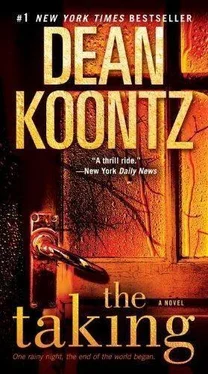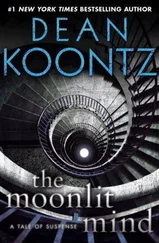Either the transmissions had been received in broken segments or they had been edited for this news broadcast. They began with surprise, excitement, even wonder. Soon the tone changed.
First, a crew member speaking English with a Russian accent reported that following a failure of exterior cameras, their computer recorded the successful docking of an unknown craft with the space station. This came as a surprise, because radar had not detected an approaching mass of any kind, neither orbiting space junk nor a UFO exhibiting controlled flight.
The communications officer, Wong, had been unable to raise a response from the visitors. "Are we really sure something's docked with us?"
"Positive," said the Russian.
"Not a computer malfunction, a false docking report?"
"Nyet. I felt it, so did you, we all did."
Another crew member, straight out of Texas, declared that from a porthole with a partial view of the docking module, he was unable to make a direct visual confirmation of the visiting spacecraft. "Momma taught me not to be profane but, Christ, from here I oughta be able to see a piece of that puppy, shouldn't I?"
The Russian again: "Heads-up, everyone! Computer shows outer airlock hatch cycling open."
Another American, this one with a Boston accent, said, "Who the hell gave the go signal for that?"
"No one," the Russian said. "They now control our systems."
"They who?"
The Texan said, "Maybe Jamaica has a space program nobody knew about," but he didn't get a laugh.
Molly had let the Explorer's speed fall below five miles an hour because the drama high above the earth distracted her so much that she could not concentrate adequately on the rain-curtained roadway.
Evidently having returned from the porthole that provided a partial view of the docking module, perhaps studying various interior cameras on a bank of monitors, the Texan said, "Lapeer, is that you I see inboard of the airlock?"
"Yes, it's me, Willy," replied a woman with a French or perhaps Belgian accent. "I'm here in reception with Arturo. Instruments show positive pressure in the airlock. In fact, it's almost up to full atmosphere."
The Russian again: "Better get out from there, Emily. You, too, Arturo. Retreat, get secured bulkheads between them and you, until we understand situation."
Excited, Emily Lapeer laughed, if nervously. "It's a new dawn, Ivan. Not a time for old fears."
Another voice, female, perhaps German, said urgently, "Lose the idealism, Emily. Think. Boarding protocols ought to be universal. This is too aggressive. It feels hostile."
"That's a xenophobic interpretation," Lapeer protested.
The German disagreed: "That's common sense."
The Texan said, "I agree, Lapeer. Pull back, seal hatches as you go. Haul ass out of there."
Lapeer said, "This is history."
The Russian had more bad news: "Airlock cameras gone blind. If visitors boarding, can't see what they look like."
"We can hear noises in the airlock," Lapeer reported.
The Texan said, "Sonofabitch, Lapeer, the cameras inboard of the airlock just died, too. This sucks like a sump pump. We can't see you anymore, either."
Startled if not alarmed, Lapeer spoke in rapid French, then reverted to English: "Something impossible is happening here-"
Maybe it was Arturo who said, "What the shit-?"
Lapeer said, "-not opening the inner airlock hatch, but just, just phasing through it-"
"Say what?"
"- materializing right out of the steel-"
The Russian said, "Computer shows that hatch closed."
Sudden overwhelming terror reduced Emily Lapeer to the urgent, tremulous petitions of a frightened child: "Sainte Marie, mčre de Dieu, non, non, bénie Marie, non, sauvez-moi!"
Down there in the reception chamber of the space station, inboard of the airlock, Arturo began to scream in wordless horror-then in agony.
"Mčre de Dieu, sauvez-moi! Bénie Marie, non, non, NON-"
Abruptly, Emily Lapeer's desperate prayer gave way to screams that matched the intensity of Arturo's.
Although she and Neil might be safer if they kept moving, Molly could not drive. Her ability to focus was stolen from her not by fear but by empathy, by pity. She braked to a stop and sat shaking.
Neil at once reached out to her. Grateful that she was not alone, grateful beyond expression, Molly seized his hand and held it tightly.
High above Earth, from various chambers of the space station, the crew shouted to one another over the open intercom system. At times they spoke English, and at times they reverted to their native tongues, but no matter what language they spoke, their questions and pleas were the same:
What's happening? where are you? can you hear me? are you there? what are they? what're they doing? why, where, how? keep them out! brace the door! no! help me! somebody! help me, God, help me! God! please, God, NO!
Then only screaming.
Maybe because the screams were twice removed-transmitted from orbit, recorded on tape or disc, replayed by the radio station-Molly was aware of subtle nuances of terror and agony and dread that she would not have heard if she had been present at the slaughter itself. The cries were first shrill and piercing, sharp with disbelief and denial, then grew more hoarse and terrible, before finally becoming wet, raw, the essence of misery. These were the tortured shrieks and sobs of men and women being slowly torn limb from limb, eviscerated by a patient evil that wanted time to savor its work.
After the invaders had progressed chamber by chamber from one end of the space station to the other, after every luckless member of the crew had been reduced to the wretched squeals of animals in the dung-splattered vestibule of a slaughterhouse, the victims fell silent, one by one, until the voice of a single astronaut cried down from that highest throne of human technology. His cry came through vacuum and stratosphere, through the last good day on one side of the planet and through the beginning of the longest night, through the gathering storm that, at the time of his suffering, had not yet begun to drown the earth, and his wail of agony came as a warning to the world, a clarion bell and bell vesper that tolled the final hour.
His lonely voice rang out one last time.
Silence followed, reverberant with the memory of terror.
Listening, Molly had been able to breathe only in quick shallow shudders, and now she held her breath entirely, head cocked, ear bent closer to the radio.
Out of the dead space station came a new voice-deep, silken, strange-with all the riveting power of a Presence summoned by forbidden incantations to a candle-encircled pentagram drawn with lamb's blood. It spoke in a language that perhaps had never before been heard on Earth.
"Yimaman see noygel, see refacull, see nod a bah, see naytoss, retee fo sellos."
In addition to a love of words and a passion for poetry, Molly possessed the ability to memorize verse with ease, as a piano prodigy can hear a song just once and thereafter play it note for note. Those alien words had a rhythm reminiscent of poetry, and when the inhuman voice on the radio repeated what it had said, she murmured along with it:
"Yimaman see noygel, see refacull, see nod a bah, see naytoss, retee fo sellos."
Although she knew nothing of their meaning, she sensed arrogance in those words: arrogance sharp with a sense of triumph, bitterness, blackest hatred, and rage beyond the capacity of the darkest of human hearts, rage beyond all understanding.
"Yimaman see noygel
see refacull
see nod a bah
see naytoss
retee fo sellos," Molly said once more, though this time she spoke alone.
On the radio, dead air gave way to the voice of the agitated newsman: "War of the worlds, America. Fight back, fight hard. If you have guns, use 'em. If you don't have guns, get 'em. If anyone out there in the government can hear me, for God's sake break out the nukes. There can be no surrender-"
Читать дальше
Конец ознакомительного отрывка
Купить книгу










